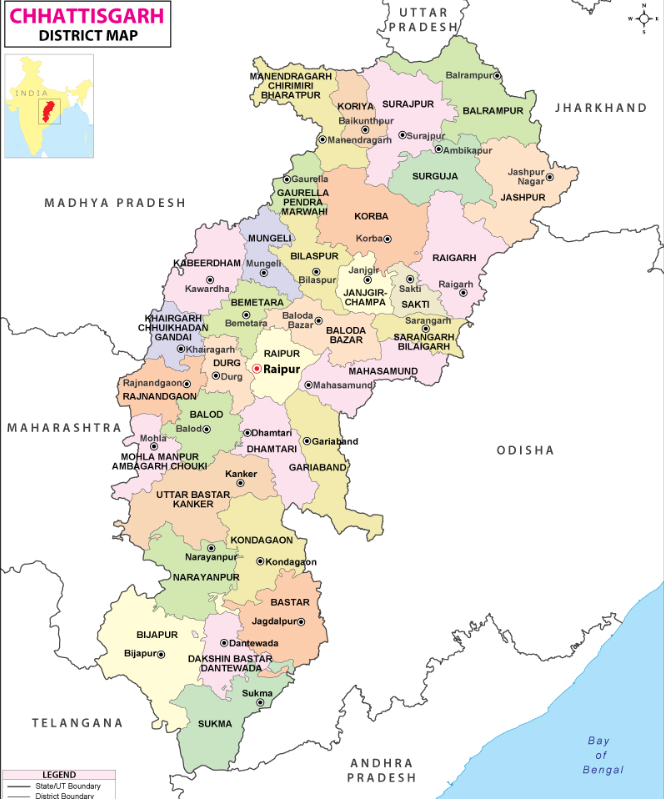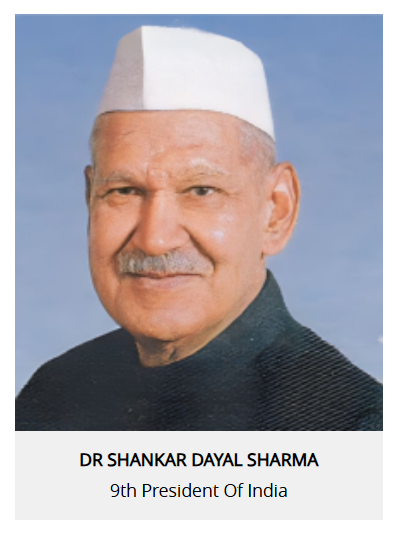Chhattisgarh Switch to Hindi
Formation of Chhattisgarh
Why in News?
Chhattisgarh is celebrating its Silver Jubilee year, marking 25 years since its formation. As part of its Silver Jubilee celebrations, the Public Relations Department organized a photo exhibition and quiz competition in Raipur.
Key Facts About Chhattisgarh
- History: The history of Chhattisgarh dates back to the 4th century C.E., when it was known as Dakshin Kosala. The name "Chhattisgarh" means "thirty-six forts," referring to the Hehaya dynasty of Ratanpur.
- The Kalachuri dynasty ruled the region from the 9th to 18th century, with Ratanpur as their capital.
- Formation as a State: Chhattisgarh was formed on 1st November 2000, after being carved out of Madhya Pradesh.
- Its capital is Raipur, with Naya Raipur (Atal Nagar) being developed as a modern smart city.
- Geographical Significance: It is the 9th largest state in India with an area of 135,192 square kilometers. The state is rich in natural resources, especially coal, iron ore, and bauxite, making it a key hub for power, steel, and cement industries.
- Chhattisgarh is also known as the 'Rice Bowl of India' due to its high rice production. More than 40% of its land is forested.
Unique Facts About Chhattisgarh
- Both the Tropic of Cancer and the Indian Standard Time (IST) meridian pass through Chhattisgarh, with their intersection located in Surajpur.
- The Indian Standard Time meridian runs through several districts in Chhattisgarh, including Surajpur, Korba, Janjgir-Champa, Balodabazar, Mahasamund, Gariaband, and Balod.
- This meridian, which is based on the 82.5° E longitude, is used to calculate IST.
- The standard meridian of India also passes through other states, such as Uttar Pradesh (Mirzapur, village Kharavada), Madhya Pradesh, Odisha, and Andhra Pradesh.
- The Tropic of Cancer, situated at 23° 26′ North latitude, crosses through eight Indian states: Gujarat, Rajasthan, Madhya Pradesh, Chhattisgarh, Jharkhand, West Bengal, Tripura, and Mizoram.
- In Chhattisgarh, the Tropic of Cancer passes through the districts of Korea (Koriya), Surajpur, Balrampur, and Manendragarh-Chirmiri-Bharatpur.
National Current Affairs Switch to Hindi
World Humanitarian Day
Why in News?
On August 19th, World Humanitarian Day is observed to recognize the dedicated efforts of those who risk their lives to assist others in times of crisis. It also serves as a day to show support for the millions of people whose lives are endangered due to conflict and disasters.
Key Points
- About: World Humanitarian Day, led by the United Nations Office for the Coordination of Humanitarian Affairs (OCHA), advocates for the well-being, dignity, and survival of people affected by crises, as well as the safety of humanitarian workers.
- History: On 19th August 2003, a bomb attack on the Canal Hotel in Baghdad killed 22 humanitarian aid workers, including Sergio Vieira de Mello, the UN Special Representative of the Secretary-General for Iraq.
- In his honor, the United Nations General Assembly adopted a resolution to designate this day as World Humanitarian Day (WHD).
- Theme: This year's theme calls for ending attacks on humanitarians and civilians and ending impunity under International Humanitarian Law, urging those in power to #ActForHumanity.
- The #ActForHumanity campaign with a call for:
- Protection of humanitarian workers and the civilians they serve
- Upholding international humanitarian law
- Funding the vital lifelines that humanitarian aid provides
- The #ActForHumanity campaign with a call for:
National Current Affairs Switch to Hindi
104th Birth Anniversary of Dr Shanker Dayal Sharma
Why in News?
On the occasion of Dr. Shanker Dayal Sharma's 104th birth anniversary, the ninth President of India (served from 25th July 1992 to 25th July 1997), President Droupadi Murmu paid floral tributes at Rashtrapati Bhavan.
Key Facts About Dr Shanker Dayal Sharma
- About: Dr Shanker Dayal Sharma, born on 19th August 1918 (Bhopal, Madhya Pradesh), was an esteemed lawyer, politician, and the President of India.
- He played a crucial role in India’s independence struggle and made significant contributions in various political capacities.
- Education: Dr Sharma pursued his higher education at Agra and Lucknow Universities.
- After obtaining a doctorate in law from Cambridge University, he attended Lincoln’s Inn in London and Harvard University.
- He began his legal practice in 1940 in Lucknow.
- Literary Work: He was also a noted poet and writer. He authored several books and edited prestigious publications such as the Lucknow Law Journal (1941-43) and Socialist India (1971-74).
- Political Journey: He became a member of the erstwhile Bhopal Legislative Assembly from 1952 to 1956 and went on to serve as the youngest Chief Minister of the state.
- He was re-elected to the Madhya Pradesh Legislative Assembly from 1956 to 1971 and also served as the Governor of Andhra Pradesh, Punjab, and Maharashtra.
- In 1971, he was elected to the Lok Sabha and served as the Minister of Communications from 1974 to 1977.
- Vice-Presidency and Presidency: In 1984, Dr. Sharma was elected as the eighth Vice President of India, serving in that role for two terms until he was elected as the President of India in 1992.
- In October 2000, President Shri K.R. Narayanan released a special commemorative postage stamp in honor of Dr. Shankar Dayal Sharma.
- Death: Dr Shanker Dayal Sharma passed away on 26th December 1999, following a massive heart attack.
Some Facts About the Office of the President of India
- Two Terms: The only President of India to have served two terms is Dr. Rajendra Prasad.
- Presidential Deaths: So far, two Presidents, Dr. Zakir Hussain and Fakhruddin Ali Ahmed, have passed away during their term in office.
- Acting President: When Dr. Zakir Hussain passed away in May 1969, the then Vice-President, V.V. Giri became the acting President.
- Following this, V.V. Giri resigned to contest the presidential election.
- CJI as Acting President: After V.V. Giri's resignation, Chief Justice M. Hidayatullah served as the officiating President from 20th July 1969 to 24th August 1969.
Note: Justice Hidayatullah is the only person in Indian history to have served in all three highest constitutional offices: Chief Justice of India, Acting President and Vice President.
Presidents of India (1950-2025)
|
S.No. |
Name |
Term Start |
Term End |
Duration |
Key Details |
|
1 |
Dr. Rajendra Prasad |
26th January 1950 |
13th May 1962 |
12 years, 107 days |
First President of India; Only President to serve two terms |
|
2 |
Dr. Sarvepalli Radhakrishnan |
13th May 1962 |
13th May 1967 |
5 years |
Philosopher-President; Teacher's Day celebrated on his birthday |
|
3 |
Dr. Zakir Husain |
13th May 1967 |
3rd May 1969 |
1 year, 355 days |
First Muslim President; Died in office |
|
Acting |
V.V. Giri |
3rd May 1969 |
20th July 1969 |
78 days |
Acting President after Zakir Husain's death |
|
Acting |
Justice Mohammad Hidayatullah |
20th July 1969 |
24th August 1969 |
35 days |
CJI acted as President; V.V. Giri resigned to contest election |
|
4 |
V.V. Giri |
24th August 1969 |
24th August 1974 |
5 years |
Won as independent candidate against official Congress nominee |
|
5 |
Fakhruddin Ali Ahmed |
24th August 1974 |
11th February 1977 |
2 years, 171 days |
Died in office during Emergency period |
|
Acting |
B.D. Jatti |
11th February 1977 |
25th July 1977 |
164 days |
Acting President; Former Chief Minister of Karnataka |
|
6 |
Neelam Sanjiva Reddy |
25th July 1977 |
25th July 1982 |
5 years |
First President elected unopposed |
|
7 |
Giani Zail Singh |
25th July 1982 |
25th July 1987 |
5 years |
First Sikh President |
|
8 |
R. Venkataraman |
25th July 1987 |
25th July 1992 |
5 years |
Former Vice President and Defence Minister |
|
9 |
Dr. Shankar Dayal Sharma |
25th July 1992 |
25th July 1997 |
5 years |
Former Chief Minister of Madhya Pradesh |
|
10 |
K.R. Narayanan |
25th July 1997 |
25th July 2002 |
5 years |
First Dalit President; Career diplomat |
|
11 |
Dr. A.P.J. Abdul Kalam |
25th July 2002 |
25th July 2007 |
5 years |
"People's President"; Missile Man of India |
|
12 |
Pratibha Patil |
25th July 2007 |
25th July 2012 |
5 years |
First Woman President of India |
|
13 |
Pranab Mukherjee |
25th July 2012 |
25th July 2017 |
5 years |
Veteran politician; Former Finance Minister |
|
14 |
Ram Nath Kovind |
25th July 2017 |
25th July 2022 |
5 years |
Second Dalit President; Former Governor of Bihar |
|
15 |
Droupadi Murmu |
25th July 2022 |
Current |
3+ years |
Current President; First tribal woman President |
National Current Affairs Switch to Hindi
10th Anniversary of National Anubhav Awards
Why in News?
Dr. Jitendra Singh, Union Minister of State for the Personnel, Public Grievances and Pensions, awarded the 8th "National Anubhav Awards" during the ceremony at Vigyan Bhawan, alongside the 57th Pre-Retirement Counselling Workshop.
Key Points
- Awards 2025: The 10th anniversary of the Anubhav Awards in 2025 highlighted significant milestones in governance and diversity.
- One-third of this year's awardees were women, reflecting the increasing presence of women officials in governance.
- A total of 15 awardees from 11 ministries and departments were honored, including officers from a public sector bank and a central public sector enterprise for the first time.
- Notable Awardees:
- M. Venkatesan: Recognized for his service during critical times, including the 2014 Kashmir floods and Ukraine evacuation of 2022.
- Hukum Singh Meena: Led the digitization of land records in over 6.4 lakh villages.
- Shalini Kacker (SBI): Instrumental in Direct Benefit Transfer, pension reforms, and Digital Life Certificate campaigns.
- O. Virupakshappa (Department of Posts): Expanded postal savings and insurance schemes in rural areas.
- Saju P.K. (CRPF): Served in sensitive operational areas like Assam and Pulwama.
- Pre-Retirement Counselling: The event included pre-retirement counselling to inform soon-to-retire employees about pension procedures, health benefits, investment options, and income tax matters.
- New Initiatives Launched: The event saw the release of several initiatives, including:
- Guidelines for the Digital Life Certificate Campaign 4.0.
- A Coffee Table e-Book highlighting success stories from Special Campaign 2.0.
- Plans have also been announced to use artificial intelligence to analyze memoirs submitted on the Anubhav portal.
National Anubhav Awards
- About: The Anubhav Awards, initiated by the Department of Pension and Pensioners' Welfare (DoPPW), is designed to recognize and document the experiences of retiring and retired Central Government employees.
- Launched in March 2015 on the direction of the Prime Minister of India, the objective is to create a culture of sharing experiences, fostering good governance and administrative reforms through the Anubhav Portal.
- Eligibility: Retiring Central Government employees/pensioners are eligible. Write-ups published on the Anubhav Portal, during the time frame notified by DoPPW, are considered for the awards.





 PCS Parikshan
PCS Parikshan



